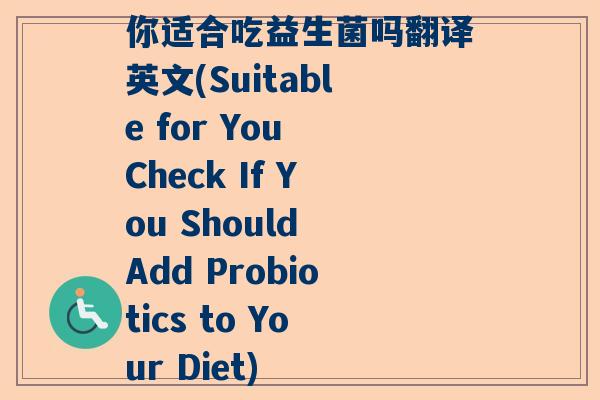Suitable for You Check If You Should Add Probiotics to Your Diet
Probiotics have become a popular topic in recent years. Many people believe that adding probiotics to their diet can improve digestion, boost immunity, and enhance overall health. However, not everyone needs to incorporate probiotics into their diet. In this article, we will discuss how to check if probiotics are suitable for you.
Understand What Probiotics Are

Probiotics are live microorganisms that can provide health benefits when consumed in adequate amounts. These microorganisms are often referred to as "good" bacteria because they help maintain a healthy balance of bacteria in the gut. Probiotics can be found in foods such as yogurt, kimchi, kefir, sauerkraut, and kombucha, or taken as supplements.
Consider Your Dietary Habits
The first step in determining if probiotics are suitable for you is to consider your dietary habits. If you regularly consume fermented foods like yogurt and sauerkraut, you may already be getting enough probiotics in your diet. However, if you rarely eat these types of foods, adding probiotic-rich foods or supplements to your diet may be beneficial.
Assess Your Gut Health
The health of your gut is another factor to consider when determining if probiotics are suitable for you. If you experience digestive issues like bloating, constipation, or diarrhea, you may benefit from adding probiotics to your diet. Probiotics can help rebalance the bacteria in your gut and improve digestive health. Additionally, if you have taken a course of antibiotics recently, probiotics can help replenish the healthy bacteria that antibiotics can kill off.
Check for Underlying Health Conditions
If you have an underlying health condition, it is important to speak with your healthcare provider before adding probiotics to your diet. While probiotics are generally safe, they may interact with certain medications or exacerbate certain health conditions. People with weakened immune systems, inflammatory bowel disease, or a history of pancreatitis should exercise caution when adding probiotics to their diet.
Start Slowly
If you have determined that probiotics may be suitable for you, it is important to start slowly. Introduce probiotic-rich foods or supplements gradually to allow your body to adjust. It is also important to note that not all probiotics are created equal. Look for products that have a high number of colony-forming units (CFUs) and are backed by scientific research.
The Bottom Line
Probiotics can be beneficial for many people, but they are not necessary for everyone. Consider your dietary habits, gut health, and underlying health conditions before adding probiotics to your diet. If you do decide to incorporate probiotics into your diet, start slowly and choose products that are backed by scientific research.
Ultimately, the decision to add probiotics to your diet is a personal one. Speak with your healthcare provider if you have any concerns about whether probiotics are suitable for you.
 南柯网
南柯网